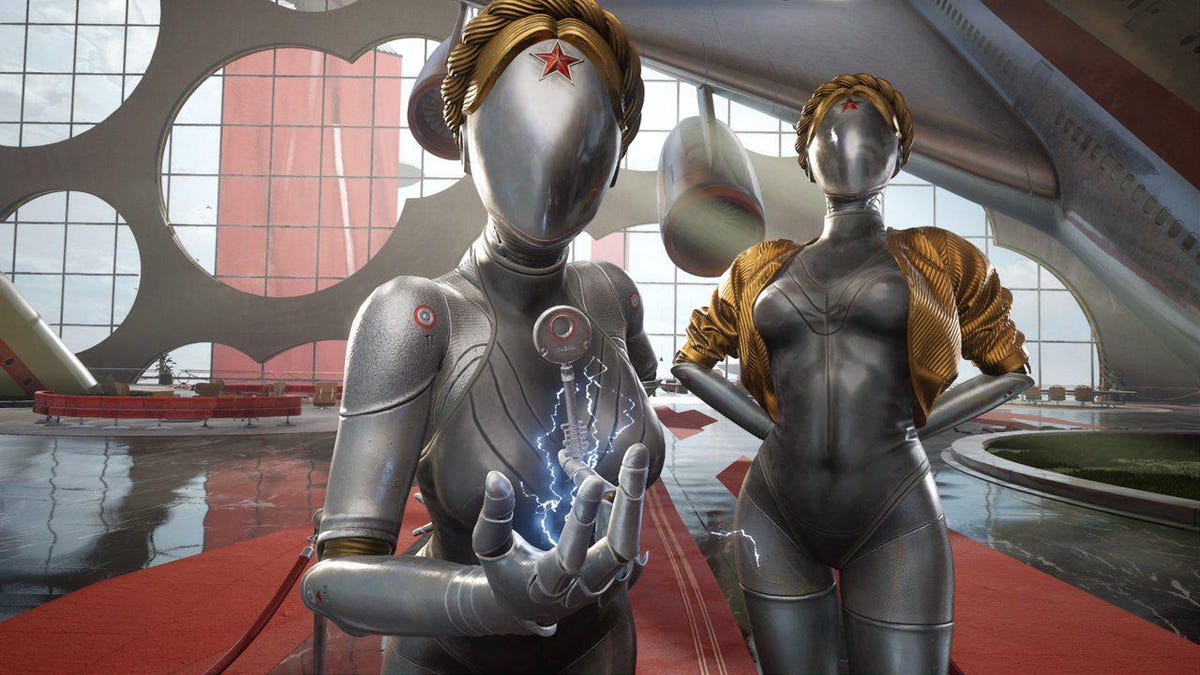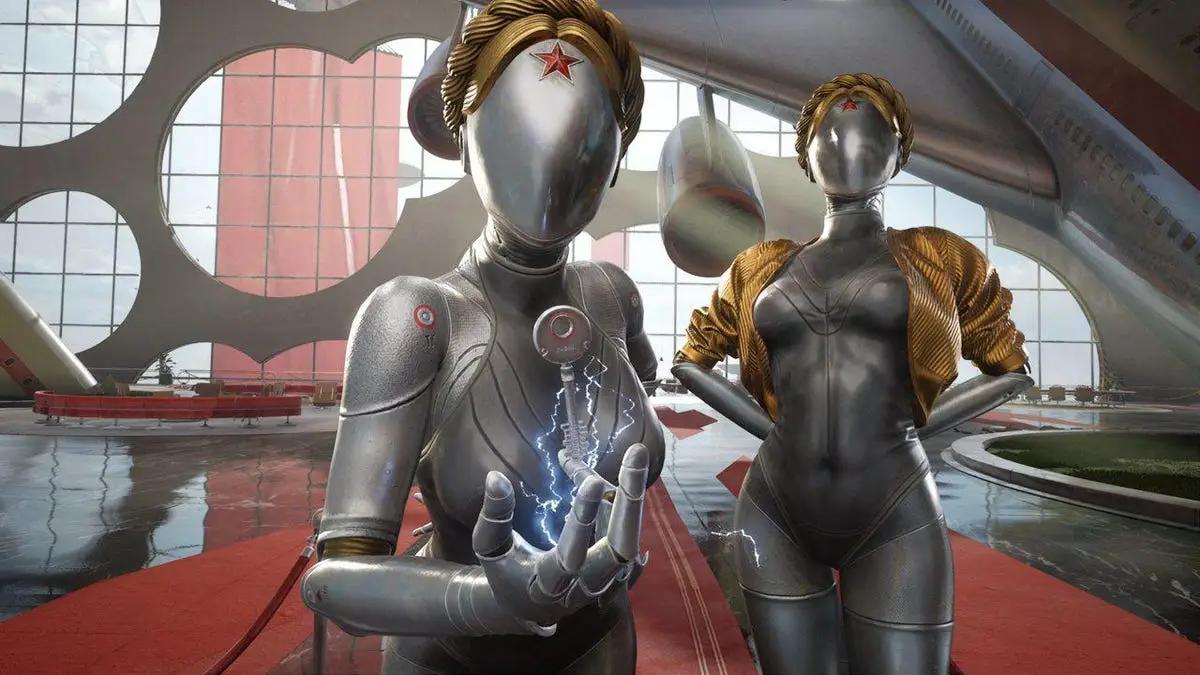The ‘Atomic Heart’ Controversy Should Prompt Deep Reflection of What Imperialism We Tolerate

Nothing says Black History Month more than two major media pieces discussed in the context of how they contribute to human rights abuses. First, there’s Hogwarts Legacy. A mid-game that has done fairly well in sales despite the well-established fact that active transphobe J.K. Rowling would directly reap the financial benefits of the game and send a signal to Warner Bros. that her bigotry was just bad PR to wait out. In the last week or so, the conversation has widened to a new video game, and that’s Atomic Heart.
Set in an alternative 1955, this first-person shooter follows a KGB agent confronting a USSR where robots have gone rogue. After a post-WWII technological boom, the Soviet state harnessed advanced robotics to complete most labor tasks. The game’s conflict arises when some robots act out of place and you must investigate and prevent further destruction. The controversy isn’t the robots known as “The Twins” being prominently featured as sex objects to sell the game (nor is it the rumored six-hour robot-sex cutscene.)
Instead, Atomic Heart is being criticized for its connections to the Russian government, and the invasion of Ukraine. Because of this, some are calling for a boycott. Additionally, there’s been a call for Sony, Microsoft, and Valve to pull the game from their storefronts. While the major criticism comes from the game’s link to funding war, the conversation features an undercurrent of claims that the game also serves as propaganda.
The red elephant in the room of Atomic Heart
Some people have criticized the game as “pro-Russian” propaganda. This is plausible, considering the many ties the government has to the game (some of which are outlined below). However, it’s worth noting the language used. Russia and Russian people aren’t inherently bad. The government and many individuals in power are. This sounds like a “no shit” thing to point out, but most people don’t make that distinction and don’t hear themselves dehumanizing a whole region.
Is this pro-USSR propaganda? Based on everything released, probably. You’re playing from the perspective of a KGB agent (basically Russian CIA) seemingly loyal to the state and its values. Unlike a similar-looking game like Wolfenstein (which, alongside BioShock and Doom, this game has been compared to), you are playing a soldier of the state. In talking about the gameplay and aesthetics, YouTuber Harenko noted, “This kind of approach to the showcase of the USSR and communism walks a thin line between using it for world-building and praising it.” While he believes this line has been crossed, others still see it as blurry. An Ars Technica reporter who played for a few hours and researched the game wrote:
The USSR makes the world’s best robots, its citizens live in a utopia where those robots do their menial tasks and labor, and even greater things are just about to happen. If you’ve played the Fallout or BioShock series, you know that a game can lovingly detail a world full of astounding promises, yet take apart that optimism by showing the hypocrisy, the false promises, the ego-driven leaders and actors causing so much pain, and the impact on real people’s lives when it all comes apart.
Nuance outside of these two has been far and few in-between. This is probably due to a century of Red Scare propaganda. It doesn’t help that the USSR’s empire-building present in the game is an ongoing issue. Leading up to the invasion, Russian President Vladimir Putin claimed Ukraine as a country didn’t exist. Emerging images from the Atomic Heart show major places in Ukraine, renamed as part of the USSR. As an alt-history game, this choice is relevant and shouldn’t be used as “proof” the game is narratively in service to the Russian government.
What has the studio said about Atomic Heart?

The few statements from the studio, Mundfish, have not been great. They ignored much of the outright criticism and insisted that a game (itself an expression of art) about robotics and the government wasn’t political. The Mundfish Twitter account has been accused of blocking people and declaring all criticism as bots. (The same thing has happened on the other side with people accusing pro-Atomic Heart people as Russian bots.) Additionally, Mundfish denied that the game’s release was purposely aligned with the anniversary of Russia’s invasion of Ukraine and the “Defender of the Fatherland Day.” This militaristic Russian holiday (also celebrated by former USSR areas) celebrates the draft and creation of the Red Army (from the Russian Civil War). Ukraine stopped recognizing this holiday in the 1990s.
Outside the studio, very few people connected to the game have commented on the boycott/controversy or the invasion of Ukraine. Atomic Heart‘s composer, Mick Gordon, is one of the few high-profile individuals speaking up. The Australian composer stated his project fee will be donated to help aid Ukrainian relief.
While many against the Russian government want the studio to come out and make a firm statement denouncing the Russian invasion of Ukraine, this likely is not possible. For one, people can disappear for speaking out against Russia—war or no war. This doesn’t include the other ways people can be harmed. Regardless, it’s kind of a problematic ask when it’s never expressed to American companies. This is despite the various conflicts (not officially “wars”) we are in right now, with America providing arms and more to many countries and rebel groups around the world.
Who profits from Atomic Heart?
The connection with the larger government is part of what makes this boycott very different from anything recently. Many advocating for the boycott say that the money collected from this game will go directly into the Ukranian invasion. Some of this is via taxes collected by Russia, and other funds will come from one of the people who financed the game. This ask is nearly identical to a consumer-led sanction of Russian products.
To say that the taxes of this game will fund rockets applies to every Russian and American game. I’m not referencing the misappropriated “there’s no ethical consumption under capitalism,” but this is the reality. Not only do these governments use tax money to directly and indirectly (via proxy wars) use this money on murder, but even the marketplace does this as well. For example, Microsoft (which distributes the game via the Xbox Store and Game Pass) has defense contracts with violent regimes (including the U.S.) around the world.
Also profiting from the game are the investors. Tencent, Gaijain Entertainment, and GEM Captial financed this game and, therefore, would get some of their investment back via game sales and transactions. Gaijin has had two major controversies involving the Russian invasion, but the real issue is GEM Capital. The company’s founder, Anatoliy Paliy, served in a deputy position for Russia’s Gazprom (the state-owned gas company). GEM is intimately tied to the state-owned bank and gas company. This game has largely avoided sanctions because a number of other countries are involved. Similarly, Hollywood avoids sanctions in China by partnering with Chinese production companies.
Another, smaller critique is that this game will give the Russian government access to your computer and data. While the studio is based in Cyprus, the founders are Russian and are connected to various oligarchs. Also, European Tech publication Ain.Capital, found that Mundfish originally stated that collected data might be sent to Russian authorities. In response, Mundfish told GamesRadar this was no longer the case. The company said, “The website’s privacy statement is outdated and wrong, and should have been removed years ago.” The Russian government, the U.S. government and others likely already have access to the average person’s information without possible Atomic Heart spyware. If not via social media, then through the many organizations that sell our information.
Should I buy Atomic Heart?
I’ll come out and say that buying this looks like a bad idea and sends a bad message. It sounds like I’ve been undercutting this boycott in this explanation, but if Ukrainians and others are uncomfortable with the implications of this game and there’s evidence of this, it will do harm. Why bother when there are a million other games? Like Hogwarts Legacy, the game serves as a good jumping-off point to discuss wider topics—things like double standards, imperialism, Red Scare, data harvesting, and more.
It’s important to acknowledge that there’s very little difference between engaging with Atomic Heart and a standard Call of Duty game (story mode of course.) Just as the perspective and promotion for Atomic Heart featured heavily patriotic ties to the Russian military (of past and present), so does the U.S. military and U.S. gaming industry. This isn’t to downplay the concerns of Atomic Heart, but to put the way we villainize imperialism in one game versus another. The relationship between government and entertainment extends into tech discourse—like Sinophic overtones in discussions of TikTok.
(featured image: Mundfish)
Have a tip we should know? [email protected]
